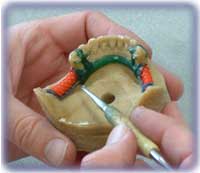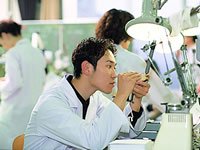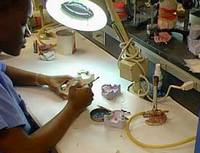Dental Lab Technician - Be Your Own Boss!
A dental lab technician has lots of responsibility. When dental patients require special appliances to chew and speak well, dentists request their assistance.
Dental technicians produce a wide variety of appliances to help patients restore the teeth's functioning ability. A qualified dental technician is skillful in using small hand instruments, has artistic abilities and pays close attention to details. Their skills are considered both science and art. Dental lab technicians play a significant role in the delivery of dental health care and take pride in producing hand crafted products.
A career as a dental technician offers many challenges. Due to the differences in the needs and makeup of dental patients, their responsibilities are both comprehensive and varied. While they seldom work directly with patients, they do work directly with dentists. The dentists provides them detailed written instructions as well as the impressions of the patient's teeth or oral soft tissues. The dental technician takes these items and uses them to create such appliances as full and partial dentures, crowns, porcelain veneers and orthodontic braces.
Dental lab technicians perform much of their work without close supervision and often experience the satisfaction that goes along with the knowledge that they help to provide a valued health care service and contribute positively to a patients' oral health and self image.

A dental technician career offers flexibility and opportunity for advancement. Most dental lab technicians work in commercial dental laboratories employing anywhere from 2 to 200 people. The average dental lab employs about five to ten technicians who may provide a full range of dental prosthetic services, or specialize in producing one particular type of prosthesis (e.g., dentures, crowns, etc.). There are also opportunities available in private dental offices for technicians who prefer close one-on-one contact with a dentist. Employment opportunities may also be available in dental schools, hospitals and with companies that manufacture dental prosthetic materials. Dental technician schools also offer some teaching positions for experienced technicians.
Dental technicians often begin with simple tasks, such as pouring plaster into an impression, and progress to more complex procedures, such as porcelain crowns and bridges. Becoming a fully trained technician requires an average of 3 to 4 years, depending upon the individual's aptitude and ambition, but it may take a few years more to become an accomplished technician.
In some laboratories, dental lab techs perform all stages of the work, whereas, in other labs, each technician does only a few of the steps. Some technicianss have job titles that reflect their area of specialization. For instance, technicians who make porcelain and acrylic restorations are called dental ceramists.
| Dental technicians generally work in clean, highly ventilated labs with lots of lighting and have very limited contact with the public. They are usually equipped with their own workbenches, Bunsen burners, grinding and polishing equipment, and hand instruments, such as wax spatulas and wax carvers. Some dental technicians have computer aided milling equipment to assist them with creating artificial teeth. |  |
Salaried dental lab technicians usually work 40 hours a week, but some work part time. In large dental laboratories, technicians may become supervisors or managers. Experienced technicians may teach or may take jobs with dental suppliers in such areas as product development, marketing, and sales. Still, for most technicians, opening one's own laboratory is the way toward advancement and higher earnings.
| Employment opportunities for dental laboratory technicians are expected to have little to no change between 2010-2020. The US Department of Labor predicts a slow increase due to the small size of the profession and the improved oral health of the population. However, their services will always be in demand for both the growing older patient population who will need prostheses to improve their nutrition, appearance and speaking abilities and for people who are retaining their teeth longer, yet require more sophisticated prosthetics for longer periods of time. |  |
Most dental technicians learn their craft on the job, as each dental lab owner operates differently, and classroom instruction does not necessarily expose students to techniques and procedures favored by individual laboratory owners. Students who have taken enough courses to learn the basics of the craft usually are considered good candidates for training, regardless of whether or not they have completed a formal program. However, some employers prefer to hire those with formal training in a related field.
Dental Lab Technician
Dental laboratory technicians may receive their education and training through a two-year program at a vocational or technical school, college, university or dental school. Programs vary greatly both in length and in the level of skill taught and graduates of these programs receive either an associate degree or a certificate. There are also a few programs that offer a four-year baccalaureate program in dental technology. In most cases, a high school diploma or its equivalent is needed to complete an dental technician program application.
